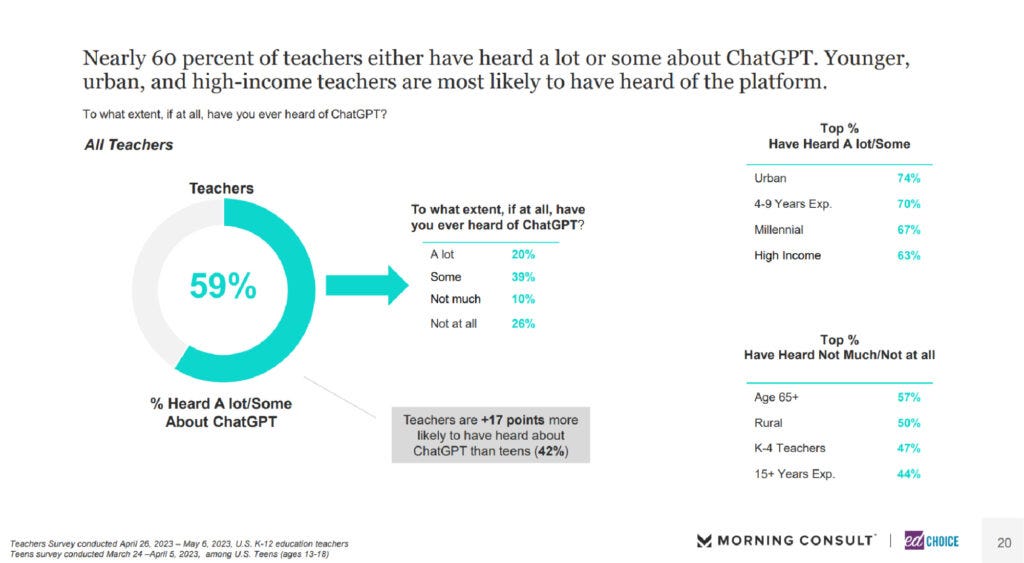Welcome back to the Education Policy Hotlist!
I am thrilled to share that this week’s post marks a special milestone - it’s the 100th post of the Hotlist! I am grateful for our growing community and the engagement many of you share with me through our education policy work. I look forward to building new ways to connect with you all and expanding our work together soon. Thank you for being a part of this journey with me. Now, let’s dive into this week’s topics!
Today, the Hotlist covers the latest developments in federal education policy, academic outcomes, assessment and accountability, AI-powered education, the teacher workforce, early childhood education, early literacy, and postsecondary pathways. A few significant themes:
Students with special needs and early learners are top-of-mind for policymakers at both the state and federal levels. Leaders are making significant efforts to keep these groups at the forefront of funding and governance decisions.
As state legislatures wrap up their 2023 sessions, governors celebrate their wins for education while other legislatures conduct post-mortems on why important bills failed to advance.
There continues to be a lot of discussion about how to rethink assessment and accountability after the Covid-19 pause. Reading about the new energy behind innovative assessment models and potential large-scale policy changes is exciting.
THE WEEKS AHEAD
Thursday, June 8, 2023, at 10:00 a.m. (MST), REL West and rural Grand County School District are hosting Using Data and Evidence to Strengthen Professional Learning Communities Around Math Instruction. Register here.
Wednesday, June 14, 2023, at noon (PST), the Education Commission of the States is hosting Shifting Formulas for Student Success. Register here.
Thursday, June 22, 2023, at noon (PST), CCSSO is hosting Using State ESSER Funds to Support Innovative Educator Pathways. Register here.
FEDERAL EDUCATION POLICY
The Office of Educational Technology (OET) at ED released a report and recommendations about using AI in education [ED].
IES released the latest Condition of Education report, including a breakdown of critical indicators [IES].
IES director Mark Schneider shares authentic takes with the74 [The74].
Representatives Bonamici (D-OR), Castro (D-TX), Fitzpatrick (R-PA), and Hinson (R-IA) established the Pre-K and Child Care Caucus [Congress].
President Biden announced actions to address youth mental health, safety, and privacy online [The White House].
A new guide provides updated information about how schools can receive Medicaid services and process claims [Medicaid].
ACADEMIC OUTCOMES
A new international study by the World Bank documents that Covid-19 school closures caused students across the globe to lose up to a year of learning after being out of school for 20 weeks [World Bank].
A Colorado bill that would have allowed students individualized learning plans failed to advance past the House Education Committee [CO].
The most effective tutoring programs have three key elements: delivered at school during the day, occurring three or more days a week, and paid and trained tutors committed to professional learning [J-PAL].
Michigan researchers release new data about students’ pandemic recovery [EPIC].
ASSESSMENT, ACCOUNTABILITY, AND GOVERNANCE
A handful of states are considering removing A-F grading systems used for accountability [K12Dive].
Scott Marion writes about why and how we can clear two significant hurdles to innovative assessment models through the federal innovative assessment program: comparability and scaling [The Center for Assessment].
New Mexico Governor signed an executive order, sidestepping the legislative process, to establish a new state office for 50,000 special education students across the state [NM].
“We want the world to know that this is a place that’s willing to do whatever it takes to make those differences for every single family, every single child, every single school,” Governor Lujan Grisham said.
In partnership with Cambium Assessment, Arkansas is releasing a new statewide summative assessment for next spring [AR].
AI-POWERED EDUCATION
Generative AI regulations should provide a modern take on data privacy policies [Brookings].
According to Joel Rose, for AI to be transformative, “Policymakers must create the conditions for student-centered learning to emerge” [The74].
Nearly 60 percent of teachers have heard about ChatGPT. However, fewer say they have used the new AI platform [EdChoice].
TEACHER WORKFORCE
American University pays future teachers through a tutoring program in Washington, D.C. [EdSurge].
A new policy hub includes examples and resources for state policies to support the teacher workforce and pipeline [ExcelinEd].
Learn more about how teachers are bargaining for the common good [EdSource].
EARLY CHILDHOOD EDUCATION
Illinois wants to create 5,000 new preschool openings in preschool deserts [IL].
Minnesota creates the Department of Children, Youth, and Families to support early childhood education and services [MN]. Read more about how state governance models vary across the U.S.
EARLY LITERACY
Principals are essential instructional leaders and brokers in New York City’s push to advance the science of reading [NYT].
Indiana passed a robust early literacy bill that requires and funds the science of reading [Chalkbeat].
POSTSECONDARY PATHWAYS
Alabama Governor will sign the Alabama Credential Quality and Transparency Act establishing an online registry of educational and occupational credentials offered across the state [AL].
ICYMI
The Learner Engagement and Attendance Program is an enormous success story. Not only because they saw immediate and significant declines in student absenteeism but also because the Connecticut Department of Education had the foresight to commit to an evaluation early on and can now own this win for students and families.
Dr. Christine M. T. Pitts serves as Senior Policy Fellow at the Center on Reinventing Public Education, leading policy and external affairs. With a teacher and researcher background, Christine previously led research and evaluation for Portland Public Schools. She served as Policy Advisor at NWEA, overseeing state and federal policy to advance equity and innovation in educational assessment. Follow her on LinkedIn, Instagram, and Twitter for updates.







